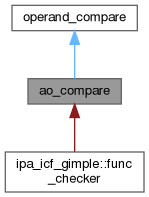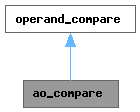#include <tree-ssa-alias-compare.h>


Public Types | |
| enum | ao_ref_diff { SEMANTICS = 1 , BASE_ALIAS_SET = 2 , REF_ALIAS_SET = 4 , ACCESS_PATH = 8 , DEPENDENCE_CLIQUE = 16 } |
Public Member Functions | |
| int | compare_ao_refs (ao_ref *ref1, ao_ref *ref2, bool lto_streaming_safe, bool tbaa) |
| void | hash_ao_ref (ao_ref *ref, bool lto_streaming_safe, bool tbaa, inchash::hash &hstate) |
| virtual bool | operand_equal_p (const_tree, const_tree, unsigned int flags) |
| virtual void | hash_operand (const_tree, inchash::hash &, unsigned flags) |
Protected Member Functions | |
| bool | verify_hash_value (const_tree arg0, const_tree arg1, unsigned int flags, bool *ret) |
Private Member Functions | |
| bool | operand_equal_p (tree, const_tree, tree, const_tree, unsigned int flags) |
Detailed Description
A class aggregating all connections and semantic equivalents for a given pair of semantic function candidates.
Member Enumeration Documentation
◆ ao_ref_diff
Member Function Documentation
◆ compare_ao_refs()
| int ao_compare::compare_ao_refs | ( | ao_ref * | ref1, |
| ao_ref * | ref2, | ||
| bool | lto_streaming_safe, | ||
| bool | tbaa ) |
Compare REF1 and REF2 and return flags specifying their differences. If LTO_STREAMING_SAFE is true do not use alias sets and canonical types that are going to be recomputed. If TBAA is true also compare TBAA metadata.
References ACCESS_PATH, alias_ptr_types_compatible_p(), ao_ref_alias_ptr_type(), ao_ref_alias_set(), ao_ref_base(), ao_ref_base_alias_ptr_type(), ao_ref_base_alias_set(), BASE_ALIAS_SET, component_ref_to_zero_sized_trailing_array_p(), DECL_BIT_FIELD, DECL_FIELD_BIT_OFFSET, DECL_FIELD_OFFSET, DECL_SIZE, DEPENDENCE_CLIQUE, ends_tbaa_access_path_p(), get_object_alignment_1(), get_ref_base_and_extent(), handled_component_p(), i, known_eq, ao_ref::max_size, MR_DEPENDENCE_BASE, MR_DEPENDENCE_CLIQUE, NULL, OEP_ADDRESS_OF, OEP_MATCH_SIDE_EFFECTS, ao_ref::offset, operand_compare::operand_equal_p(), ao_ref::ref, REF_ALIAS_SET, same_type_for_tbaa(), SEMANTICS, ao_ref::size, TREE_CODE, TREE_OPERAND, TREE_THIS_VOLATILE, TREE_TYPE, TYPE_SIZE, types_compatible_p(), types_equal_for_same_type_for_tbaa_p(), and view_converted_memref_p().
Referenced by ipa_icf_gimple::func_checker::compare_operand().
◆ hash_ao_ref()
| void ao_compare::hash_ao_ref | ( | ao_ref * | ref, |
| bool | lto_streaming_safe, | ||
| bool | tbaa, | ||
| inchash::hash & | hstate ) |
Hash REF to HSTATE. If LTO_STREAMING_SAFE do not use alias sets and canonical types.
References inchash::hash::add_int(), inchash::hash::add_poly_int(), ao_ref_alias_set(), ao_ref_base(), ao_ref_base_alias_set(), DECL_BIT_FIELD, DECL_FIELD_BIT_OFFSET, DECL_FIELD_OFFSET, DECL_SIZE, operand_compare::hash_operand(), known_eq, ao_ref::max_size, OEP_ADDRESS_OF, OEP_MATCH_SIDE_EFFECTS, ao_ref::offset, r, ao_ref::ref, ao_ref::size, TREE_CODE, TREE_OPERAND, TREE_TYPE, and TYPE_SIZE.
◆ hash_operand()
|
virtualinherited |
Generate a hash value for an expression. This can be used iteratively by passing a previous result as the HSTATE argument.
Reimplemented in ipa_icf_gimple::func_checker.
References inchash::hash::add(), inchash::hash::add_commutative(), inchash::add_expr(), inchash::hash::add_hwi(), inchash::hash::add_int(), inchash::hash::add_object(), inchash::hash::add_wide_int(), bitsize_int, BUILT_IN_NORMAL, builtin_decl_explicit(), builtin_decl_explicit_p(), CALL_EXPR_FN, CALL_EXPR_IFN, commutative_tree_code(), CONSTRUCTOR_ELTS, CONSTRUCTOR_NO_CLEARING, CONVERT_EXPR_CODE_P, count, DECL_ASSEMBLER_NAME, DECL_ASSEMBLER_NAME_SET_P, DECL_BUILT_IN_CLASS, DECL_FIELD_BIT_OFFSET, DECL_FIELD_OFFSET, DECL_FUNCTION_CODE(), DECL_P, DECL_UID, error_mark_node, fixed_hash(), FOR_EACH_CONSTRUCTOR_ELT, gcc_assert, gcc_checking_assert, hash_operand(), HONOR_SIGNED_ZEROS(), i, IDENTIFIER_HASH_VALUE, integer_zerop(), IS_EXPR_CODE_CLASS, inchash::hash::merge_hash(), NULL_TREE, NUM_POLY_INT_COEFFS, obj_type_ref_class(), OBJ_TYPE_REF_EXPR, OBJ_TYPE_REF_OBJECT, OBJ_TYPE_REF_TOKEN, OEP_ADDRESS_OF, OEP_ASSUME_WRAPV, OEP_HASH_CHECK, POLY_INT_CST_COEFF, POLY_INT_CST_P, RAW_DATA_LENGTH, RAW_DATA_POINTER, real_hash(), real_zerop(), rvc_zero, SSA_NAME_VERSION, STRIP_ANY_LOCATION_WRAPPER, STRIP_NOPS, swap_tree_comparison(), TARGET_EXPR_SLOT, tcc_comparison, tcc_declaration, wi::to_wide(), TREE_CHAIN, TREE_CODE, TREE_CODE_CLASS, TREE_FIXED_CST_PTR, TREE_IMAGPART, TREE_INT_CST_ELT, TREE_INT_CST_EXT_NUNITS, TREE_OPERAND, TREE_OPERAND_LENGTH, TREE_REAL_CST_PTR, TREE_REALPART, TREE_STRING_LENGTH, TREE_STRING_POINTER, TREE_TYPE, TREE_VALUE, TREE_VEC_ELT, TREE_VEC_LENGTH, tsi_end_p(), tsi_next(), tsi_start(), tsi_stmt(), TYPE_MAIN_VARIANT, TYPE_NAME, TYPE_UNSIGNED, VECTOR_CST_ENCODED_ELT, vector_cst_encoded_nelts(), VECTOR_CST_NELTS_PER_PATTERN, VECTOR_CST_NPATTERNS, and virtual_method_call_p().
Referenced by ao_compare::hash_ao_ref(), hash_operand(), and verify_hash_value().
◆ operand_equal_p() [1/2]
|
virtualinherited |
Return nonzero if two operands (typically of the same tree node) are necessarily equal. FLAGS modifies behavior as follows: If OEP_ONLY_CONST is set, only return nonzero for constants. This function tests whether the operands are indistinguishable; it does not test whether they are equal using C's == operation. The distinction is important for IEEE floating point, because (1) -0.0 and 0.0 are distinguishable, but -0.0==0.0, and (2) two NaNs may be indistinguishable, but NaN!=NaN. If OEP_ONLY_CONST is unset, a VAR_DECL is considered equal to itself even though it may hold multiple values during a function. This is because a GCC tree node guarantees that nothing else is executed between the evaluation of its "operands" (which may often be evaluated in arbitrary order). Hence if the operands themselves don't side-effect, the VAR_DECLs, PARM_DECLs etc... must hold the same value in each operand/subexpression. Hence leaving OEP_ONLY_CONST unset means assuming isochronic (or instantaneous) tree equivalence. Unless comparing arbitrary expression trees, such as from different statements, this flag can usually be left unset. If OEP_PURE_SAME is set, then pure functions with identical arguments are considered the same. It is used when the caller has other ways to ensure that global memory is unchanged in between. If OEP_ADDRESS_OF is set, we are actually comparing addresses of objects, not values of expressions. If OEP_LEXICOGRAPHIC is set, then also handle expressions with side-effects such as MODIFY_EXPR, RETURN_EXPR, as well as STATEMENT_LISTs. If OEP_BITWISE is set, then require the values to be bitwise identical rather than simply numerically equal. Do not take advantage of things like math-related flags or undefined behavior; only return true for values that are provably bitwise identical in all circumstances. If OEP_ASSUME_WRAPV is set, then require the values to be bitwise identical under two's compliment arithmetic (ignoring any possible Undefined Behaviour) rather than just numerically equivalent. The compared expressions must however perform the same operations but may do intermediate computations in differing signs. Because this comparison ignores any possible UB it cannot be used blindly without ensuring that the context you are using it in itself doesn't guarantee that there will be no UB. Conditional expressions are excluded from this relaxation. When OEP_ASSUME_WRAPV is used operand_compare::hash_operand may return differing hashes even for cases where operand_compare::operand_equal_p compares equal. Unless OEP_MATCH_SIDE_EFFECTS is set, the function returns false on any operand with side effect. This is unnecesarily conservative in the case we know that arg0 and arg1 are in disjoint code paths (such as in ?: operator). In addition OEP_MATCH_SIDE_EFFECTS is used when comparing addresses with TREE_CONSTANT flag set so we know that &var == &var even if var is volatile.
Reimplemented in ipa_icf_gimple::func_checker.
References operand_equal_p(), and TREE_TYPE.
Referenced by ao_compare::compare_ao_refs(), ipa_icf_gimple::func_checker::operand_equal_p(), operand_equal_p(), operand_equal_p(), and verify_hash_value().
◆ operand_equal_p() [2/2]
|
privateinherited |
The same as operand_equal_p however the type of ARG0 and ARG1 are assumed to be the TYPE0 and TYPE1 respectively. TYPE0 and TYPE1 represent the type the expression is being compared under for equality. This means that they can differ from the actual TREE_TYPE (..) value of ARG0 and ARG1.
Define macros to test an operand from arg0 and arg1 for equality and a variant that allows null and views null as being different from any non-null value. In the latter case, if either is null, the both must be; otherwise, do the normal comparison.
References alias_ptr_types_compatible_p(), array_ref_element_size(), array_ref_low_bound(), call_expr_flags(), CALL_EXPR_FN, CALL_EXPR_IFN, CASE_CONVERT, commutative_tree_code(), compare_tree_int(), COMPARISON_CLASS_P, CONSTRUCTOR_ELTS, CONSTRUCTOR_NELTS, CONSTRUCTOR_NO_CLEARING, CONVERT_EXPR_P, count, DECL_BUILT_IN_CLASS, DECL_FIELD_BIT_OFFSET, DECL_FIELD_OFFSET, DECL_NAME, DECL_P, DECL_UNCHECKED_FUNCTION_CODE, ECF_CONST, ECF_PURE, element_precision(), error_mark_node, first_const_call_expr_arg(), FIXED_VALUES_IDENTICAL, fndecl_built_in_p(), gcc_checking_assert, HONOR_SIGNED_ZEROS(), i, IDENTIFIER_POINTER, constructor_elt::index, int_size_in_bytes(), integer_zerop(), MR_DEPENDENCE_BASE, MR_DEPENDENCE_CLIQUE, NULL, NULL_TREE, obj_type_ref_class(), OBJ_TYPE_REF_EXPR, OBJ_TYPE_REF_OBJECT, OBJ_TYPE_REF_TOKEN, OEP_ADDRESS_OF, OEP_ADDRESS_OF_SAME_FIELD, OEP_ASSUME_WRAPV, OEP_BITWISE, OEP_DECL_NAME, OEP_LEXICOGRAPHIC, OEP_MATCH_SIDE_EFFECTS, OEP_NO_HASH_CHECK, OEP_ONLY_CONST, OEP_PURE_SAME, OP_SAME, OP_SAME_WITH_NULL, operand_equal_p(), POINTER_TYPE_P, r, RAW_DATA_LENGTH, RAW_DATA_POINTER, real_identical(), real_zerop(), STRIP_ANY_LOCATION_WRAPPER, STRIP_NOPS, swap_tree_comparison(), tcc_binary, tcc_comparison, tcc_declaration, tcc_exceptional, tcc_expression, tcc_reference, tcc_statement, tcc_unary, tcc_vl_exp, TREE_CODE, TREE_CODE_CLASS, TREE_CONSTANT, TREE_FIXED_CST, TREE_IMAGPART, tree_int_cst_equal(), tree_nop_conversion_p(), TREE_OPERAND, TREE_REAL_CST, TREE_REALPART, TREE_SIDE_EFFECTS, TREE_STRING_LENGTH, TREE_STRING_POINTER, tree_to_uhwi(), TREE_TYPE, tsi_end_p(), tsi_next(), tsi_start(), tsi_stmt(), TYPE_ADDR_SPACE, TYPE_ALIGN, TYPE_MAIN_VARIANT, TYPE_MODE, TYPE_PRECISION, TYPE_SIZE, TYPE_UNSIGNED, TYPE_VECTOR_SUBPARTS(), types_compatible_p(), types_same_for_odr(), constructor_elt::value, vec_safe_length(), VECTOR_CST_ENCODED_ELT, vector_cst_encoded_nelts(), VECTOR_CST_LOG2_NPATTERNS, VECTOR_CST_NELTS_PER_PATTERN, VECTOR_TYPE_P, verify_hash_value(), and virtual_method_call_p().
◆ verify_hash_value()
|
protectedinherited |
References inchash::hash::end(), gcc_assert, hash_operand(), OEP_ASSUME_WRAPV, OEP_DECL_NAME, OEP_HASH_CHECK, OEP_NO_HASH_CHECK, and operand_equal_p().
Referenced by ipa_icf_gimple::func_checker::operand_equal_p(), and operand_equal_p().
The documentation for this class was generated from the following files: